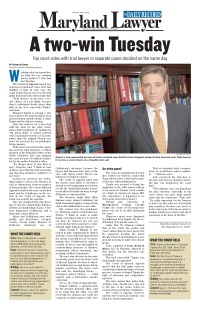Redmond v. State.
The Court of Special Appeals of Maryland held that extreme ruses of deception employed by police to obtain consent to enter (or search) may vitiate, per se, the voluntary nature of the defendant’s consent. Generally, law enforcement is permitted to use ruses as a means of obtaining consent; however, this practice is not without limits. In this case, Appellant was convicted of robbery with a deadly weapon, robbery, second-degree assault, and theft of less than $1000.[1] His conviction rested in part on the Circuit Court of Baltimore City’s ruling that denied Appellant’s motion to suppress evidence obtained as a result of a ruse.
Here, the Court set a guideline for the acceptable use of ruses by analyzing both the legality of the detectives’ employment of a ruse to obtain consent to enter the home[2] and the admissibility of evidence seized resulting from the detectives’ tactic. Finding in favor of Appellant, and reversing the Circuit Court for Baltimore City’s ruling, the Court of Special Appeals of Maryland found that the ruse used in this case was “extreme” as it played on the occupants’ willingness to assist in the capture of a (made-up) pedophile.
The Maryland Court reasoned that when a ruse is “extreme,” law enforcement officials are effectively depriving the homeowners of their ability to assess accurately whether they would consent if the true purpose of their investigation had been disclosed. Because the ruse was so egregious and created false exigent circumstances, the Maryland Court ruled the homeowners’ consent to the detectives’ entry to be involuntary and the seizure of evidence thereafter tainted. As a result, the Court found that the motion to suppress was improperly denied and remanded the case for further proceedings.
[1] Appellant used a knife to rob a teenage girl of her cell phone and other personal belongings. As a repeat offender, he was sentenced to 25 years without parole; on appeal he also challenged the legality of the sentence imposed. However, because the Court resolved the ruse issue in favor of Appellant it did not discuss the merits of this argument.
[2] Detectives told occupants of the home that they were searching for a pedophile, thereby gaining access into the home. Detectives continued operating under the guise of this ruse when they conducted a “protective sweep” shortly after their initial entry, exceeding the scope of the occupant’s initial consent – further tainting the evidence later seized. Only after using this ruse to enter (and stay in) the home then waiting four and one-half hours for a search warrant based on evidence found during the “protective sweep”, were detectives able to seize evidence associated with the true purpose of their investigation.






Leave a Reply